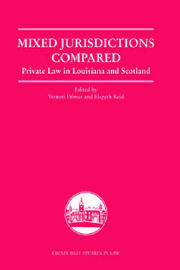Book contents
- Frontmatter
- Contents
- Preface
- List of Contributors
- List of Abbreviations
- Table of Cases
- 1 Praedial Servitudes
- 2 Title Conditions in Restraint of Trade
- 3 Servitudes: Extinction by Non-Use
- 4 Inheritance and the Surviving Spouse
- 5 Ownership of Trust Property in Scotland and Louisiana
- 6 The Legal Regulation of Adult Domestic Relationships
- 7 Impediments to Marriage in Scotland and Louisiana: An Historical-Comparative Investigation
- 8 Contracts of Intellectual Gratification – A Louisiana-Scotland Creation
- 9 The Effect of Unexpected Circumstances on Contracts in Scots and Louisiana Law
- 10 Hunting Promissory Estoppel
- 11 Unjustified Enrichment, Subsidiarity and Contract
- 12 Causation as an Element of Delict/Tort in Scots and Louisiana Law
- 13 Personality Rights: A Study in Difference
- Index
9 - The Effect of Unexpected Circumstances on Contracts in Scots and Louisiana Law
Published online by Cambridge University Press: 12 September 2012
- Frontmatter
- Contents
- Preface
- List of Contributors
- List of Abbreviations
- Table of Cases
- 1 Praedial Servitudes
- 2 Title Conditions in Restraint of Trade
- 3 Servitudes: Extinction by Non-Use
- 4 Inheritance and the Surviving Spouse
- 5 Ownership of Trust Property in Scotland and Louisiana
- 6 The Legal Regulation of Adult Domestic Relationships
- 7 Impediments to Marriage in Scotland and Louisiana: An Historical-Comparative Investigation
- 8 Contracts of Intellectual Gratification – A Louisiana-Scotland Creation
- 9 The Effect of Unexpected Circumstances on Contracts in Scots and Louisiana Law
- 10 Hunting Promissory Estoppel
- 11 Unjustified Enrichment, Subsidiarity and Contract
- 12 Causation as an Element of Delict/Tort in Scots and Louisiana Law
- 13 Personality Rights: A Study in Difference
- Index
Summary
INTRODUCTION
In times of economic stability, long-term contracts may, in theory, act as an efficient tool of financial planning. They provide a means for buyers of goods or services to achieve certainty of supply, and for sellers to achieve a guaranteed income stream. In times of instability, long-term contracts take on an altogether less attractive mien. Contracting parties and their lawyers are prompted to re-read contract terms in search of escape routes. Most – possibly all – legal systems refuse to release parties from contracts solely on the ground that they have become economically less attractive to perform. However, there are more deserving cases, where radical and unprecedented changes of conditions make it unfair to hold parties to their original bargains. As is often the case, the task lies in developing clear rules which can be used to distinguish deserving from non-deserving cases.
In the current climate of global economic instability, naturally, the question of unexpected circumstances comes to the fore once more. And, of course, other phenomena have a similar effect. Natural events such as Hurricane Katrina affect people's lives as well as their business transactions. In some respects times have changed. Parties to commercial contracts will probably use force majeure or hardship clauses, which seek to anticipate and regulate the consequences of such events. Such clauses do not, however, provide a water-tight solution. In low-value transactions where clients do not seek advice from solicitors or legal advisers, such clauses may not be used.
- Type
- Chapter
- Information
- Mixed Jurisdictions ComparedPrivate Law in Louisiana and Scotland, pp. 244 - 280Publisher: Edinburgh University PressPrint publication year: 2009



